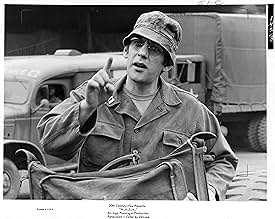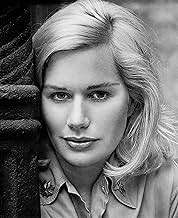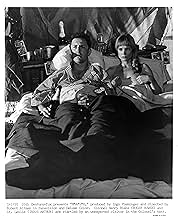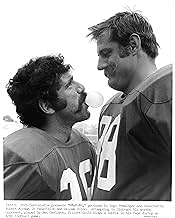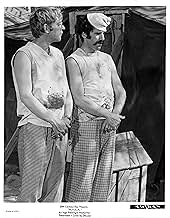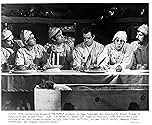The staff of a Korean War field hospital uses humor and hijinks to keep their sanity in the face of the horror of war.The staff of a Korean War field hospital uses humor and hijinks to keep their sanity in the face of the horror of war.The staff of a Korean War field hospital uses humor and hijinks to keep their sanity in the face of the horror of war.
- Director
- Writers
- Stars
- Won 1 Oscar
- 15 wins & 26 nominations total
- Cpl. Judson
- (as Tim Brown)
- Director
- Writers
- All cast & crew
- Production, box office & more at IMDbPro
Summary
Featured reviews
The irony of the film is that for the time it was considered gruesomely bloody. Yet there are no battlefield scenes; all the blood is in the surgical unit. The CSI TV series shows more carnage than M*A*S*H, but M*A*S*H was filmed over 30 years ago.
M*A*S*H is loaded with bizarro characters. Donald Sutherland, Elliot Gould, Robert Duvall, Tom Skerrit, Loretta Swit, Radar are all insane in their own way. In "M*A*S*H," everyone is cruel, playing mean practical jokes and the anti-heroes Donald Sutherland and Elliott Gould are just plain heartless. They absolutely torment Major "Hot Lips" Hoolihan and Robert Duvall. None of the characters in the film tries to be funny. There are no jokes. The humor just grows from the situation which is the grim reality of a mobile surgical unit whose doctors and nurses try their best to repair the horribly mutilated bodies from an insane war. Having worked in a hospital setting, outrageous and black humor is commonplace, especially in the ER, but in M*A*S*H it's taken to a new level.
A lot of the humor is juvenile, cruel and silly. And while I get that's the point – nothing can be more deeply juvenile, cruel and silly than war, it got repetitive and heavy handed after a while. The performances are good, but beyond Robert Duvall, none of the characters have much in the way of dimensions. People stay exactly what we think they are from the moment we meet them.
Walter Chow makes a good argument on the web site 'Film Freak Central', that the sexism, homophobia, etc are the whole point. Altman is saying we're ALL beasts at heart, even if we act like we're bucking the system. It's an interesting idea, but I'm not sure I buy it's what Altman was intending.
I think the sucess of the film and its obvious entertainment value (you will like watching this film) is due to a five star cast from top to bottom. The actors who deservedly made their reputation in this film and give fine performances throughout are Donald Sutherland, Elliott Gould, Robert Duvall, Sally Kellerman, Gary Burghoff and Bud Cort, and that's just the A-team. Heck, I could make a good movie today with just those people. From the stoic Trapper John to the bible thumping adulterer Frank Burns, the characters ring true and are fully fleshed out.
I had watched the TV show for a long time before I finally got to watch the movie - I prefer the cynical comedy of the film although I have always loved the more sitcom style approach of the series. Many critics have hailed this as an anti-war film that exposes the brutal effects of war; to some extent I suppose that is true but it is far from being a part of the main narrative - even to call it a theme would be generous! It does have some scenes of blood and gore but it is far from having anything substantial to say about the cruelty of war.
Instead I always find this film to be a very episodic, freewheeling comedy, some bits of which work and some others don't. On the whole it is pretty funny and uses the sort of sporadic dialogue and action to move it forward. At times it is based on imaginative banter between Trapper and Hawkeye and at others it is out and out slapstick such as the chaotic game of American football at the end of the film. The downside of this is that sections of it just don't work - Painless Paul's dilemma is pretty uninspiring at least - however, on the whole it is energetic and very funny. Altman's use of overlapping dialogue and his usual use of overlapping scenes as opposed to a traditional narrative flow is good here but it would have been better if it had been toned down somewhat.
The cast is what really carries the film - the plot is weak and they have no characters other than what they create themselves and, although the dialogue is good, I couldn't help the feeling that the cast did as much as the writers. As such the lead two of Sutherland and Gould stand out as great comedians with great witty touches, their characters are the largest and their lines are the funniest. Skerritt starts out as equal to them but quickly becomes a third wheel despite still giving a good performance. The support cast are all a good mix of characters whether they be played by actors such as Duvall and Kellerman or less well known faces such as Burghoff or Bowen.
Overall, I am still unable to see what those who call this a `brutal anti-war film' see but that doesn't mean I can't enjoy it as a comedy. As such though, it is very episodic and really lacks a solid narrative flow meaning that any 10 minute period could be good or bad. Aside from this lack of substance it is a funny, enjoyable comedy but it doesn't deserve the classic reputation that it has obtained.
The pendulum has swung back a lot since 1970, and for that you still get a sense of the pioneering spirit with which the film was made. The overlapping dialogue. The non-linear, character-driven plot. The caustic humor. The attacks on religion (real religion, as the New York Times noted when the film came out, not false sanctimony but actual belief in God.)
Yes, in those ways the film is as powerful now as it was when it was first released. But you see something else, something audiences didn't see in 1970, so blown away were they by the newness of it. That is the picture runs out of gas halfway through.
You have a powerful beginning, that eerie montage with the strange song "Suicide Is Painless" playing mournfully while doctors, nurses, and orderlies silently rush to relieve choppers of their human cargo. It's quietly effective, immediately giving you a sense of the 4077th MASH unit (looking much bigger and grimmer than it ever did in the TV series) and coming as close as the movie ever does to delivering an effective anti-war statement. The movie builds from there as we meet the various characters, beneficiaries of their actors' strong improvisational work. It feels like real-time eavesdropping on a community of actual human beings. Scenes like Major Burns and Hot Lips' transmitted tryst and Painless Pole's suicide attempt are not as funny as we are meant to think, but they are well shot, especially the Painless Pole bit, the best thing in the movie for pure entertainment. The way all the guys in the Swamp crack up when Painless tells them he's decided to kill himself may be the film's funniest moment.
What happens next feels like a wrong turn. Hot Lips becomes the subject of a camp bet that exposes her to massive humiliation. Call it "indecent" or "politically incorrect," it is just plain wrong, exposing the film's (and its director's) nasty streak toward women and alienating any concern you might have built up for the characters. When she and Burns were targeted before, you had a sense they had it coming because of her overbearing military approach and his blaming orderly Boone for killing a patient. This time, she's a spent force, no threat to anyone, and "a damn good nurse," as Trapper says, just doing her job as best she can despite her earlier bad experience. I'm struck dumb at the idea I'm supposed to be laughing when she rushes into Col. Blake's tent in shock and tears.
The film never recovers. Instead, it veers wildly off course, away from the camp and into two radically pointless subplots, one involving a trip by Hawkeye and Trapper to Japan where they operate on a congressman's son and a sick infant (some sort of parallel there, though lost on me), the other a football game that apparently was director Robert Altman's comment on the folly of war, but to me just shows what happens when you allow your characters to veer off-script for so long you can't make it back to the ending as written. The game takes up too much time, throws in goofy circus music complete with slide whistles, and features the once iron-willed Hot Lips in the role of outlandishly enthusiastic cheerleader for all the people who tormented her so viciously for the duration of the film. Sally Kellerman's performance in the second half of the film is nothing like it was in the first half; it's embarrassingly, cartoonishly bad. Altman should have reined her in, but you get the feeling he was just rushing by then to get it all in the can before the studio figured out what he was up to and took his film away.
Altman was just so much better making "Nashville." Obviously he learned a lot. It's amazing how pasty everyone in this film looks, particularly Donald Sutherland, who seems leprous. No wonder he tried to get Altman fired. So much of the supporting players faded away, and though they do good work, it's not a surprise. They all seem so squalid and ugly as Altman shoots them.
It's interesting comparing the characters here to their counterparts in the TV series. For me, the TV characters are usually preferable. Robert Duvall mines zero comedy from Frank Burns, playing him very seriously in comparison to Larry Linville's more likeably miserable TV Burns. Roger Bowen had a great voice, but is nearly robotic as Blake, having none of McLean Stevenson's panache. What's worse than a pompous moralizing Hawkeye with Groucho affectations? How about that annoying whistle! Even Gary Burghoff, the one real holdover from film to series, plays a nastier Radar in the movie, meaner, tougher, less innocent.
The whole film is mean, tough, less innocent. It gets points from me for that. Altman and his cast develop a magnificent mood right away. But they fail to do very much with it. "MASH" is a great 45-minute-long movie that just goes on too long.
Did you know
- TriviaThe fourteen-year-old son of director Robert Altman, Mike Altman, wrote the lyrics to the theme song "Suicide is Painless." Because of its inclusion in the subsequent television series, he continued to get residuals throughout its run and syndication. His father was paid $75,000 for directing, but his son eventually made about $2 million in song royalties, with payments continuing, from first syndication through the present day, as M.A.S.H. (1972) continues in syndication around the world.
- GoofsThroughout the film the characters are drinking the present 1970s style cans of Pabst Blue Ribbon and Budweiser. In fact, during the Korean Conflict, Pabst was not available overseas.
- Quotes
[last lines]
P.A. Announcer: [clears his throat] Attention. Tonight's movie has been "M*A*S*H." Follow the zany antics of our combat surgeons as they cut and stitch their way along the front lines, operating as bombs -
[chuckles]
P.A. Announcer: operating as bombs and bullets burst around them; snatching laughs and love between amputaions and penicillin.
Colonel Blake: [Watches as a jeep rolls away] Did Hawkeye steal that jeep?
Radar: No, sir. That's the one he came in.
Colonel Blake: Oh, very good. Come along, my dear.
[He and Lt. Leslie leave]
P.A. Announcer: Follow Hawkeye, Trapper, Duke, Dago Red, Painless, Radar, Hot Lips, Dish and Staff Seargeant Vollmer as they put our boys back together again.
[a montage of cast members starts]
P.A. Announcer: Starring Donald Sutherland, Elliott Gould, Tom Skerritt, Sally Kellerman, Robert Duvall, Jo Ann Pflug, Rene Auberjonois, Roger Bowen, Gary Burghoff, David Arkin, John Schuck, Fred Williamson, Indus Arthur, Tim Brown, Corey Fischer, Bud Cort, Carl Gottlieb, Dawne Damon, Tamara Horrocks, Ken Prymus, Danny Goldman, Kim Atwood, Michael Murphy, G. Wood, Rick Neilan and Bobby Troup.
SSgt. Gorman: Goddamn army.
P.A. Announcer: That is all.
[a gong sounds and the screen suddenly goes black. End of movie]
- Crazy creditsThe shot of Hot Lips being revealed in the shower was replaced with her exiting the helicopter in network and basic cable showings when Sally Kellerman's name was announced.
- Alternate versionsSome of the scenes that were altered in the US "PG" version:
- The arterial spurting from the neck of a patient in the operating room was removed.
- When O'Houlihan is surprised in the shower, the tent flap begins to rise but the scene cuts away before seeing her.
- The "F-word" was removed from the football game.
- ConnectionsEdited into Give Me Your Answer True (1987)
- SoundtracksSuicide Is Painless
(1970)
Music by Johnny Mandel
Lyrics by Mike Altman
Sung by an The Ron Hicklin SIngers during the opening credits
Also sung by Ken Prymus (uncredited) during the last supper scene
Details
- Release date
- Country of origin
- Languages
- Also known as
- MASH
- Filming locations
- Malibu Creek State Park - 1925 Las Virgenes Road, Calabasas, California, USA(4077th MASH Campsite)
- Production companies
- See more company credits at IMDbPro
Box office
- Budget
- $3,500,000 (estimated)
- Gross US & Canada
- $81,600,000
- Gross worldwide
- $81,600,904
- Runtime1 hour 56 minutes
- Color
- Aspect ratio
- 2.35 : 1
Contribute to this page



